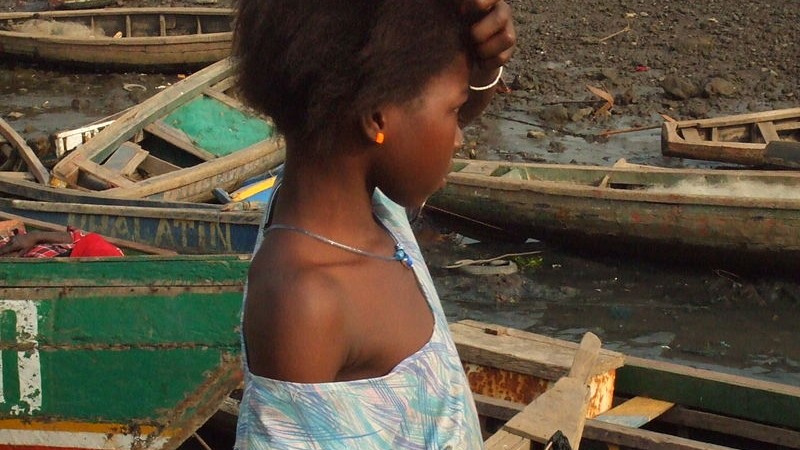The Ebola epidemic is raging, causing hysteria worldwide. The people of West Africa, where the epidemic began, are under surveillance by international health authorities. Guinée, which was already in the throes of severe socioeconomic problems before the virus’ outbreak, has suffered the brunt of the epidemic. Guinée's population, however, is coping valiantly with life's daily challenges, despite the risks, the sorrows, and the suspicion from the rest of the world.
The two bloggers quoted below illustrate Guinée's determination to survive.
Alimou Sow, a Guinean blogger, decided to eat some pizza with his wife and some friends at a small restaurant in the upper suburbs of Conakry, Guinée's capital. He describes this experience of daily life in the capital with a distinct sense of humor:
Vu de l’intérieur, le pays est comme ostracisé. Le vrombissement des avions dans le ciel de Conakry a considérablement diminué. Les étrangers ont fait leurs bagages, désertant les zones minières, les hôtels, les restos et … la bande passante sur Internet ! Depuis quelque temps, la connexion est devenue étonnamment fluide. Les téléchargements sont lénifiants. Vu de l’extérieur, sous le prisme des médias – nouveaux et anciens – toute la Guinée n’est qu’un océan d’Ebola. Beaucoup se sont barricadés de peur d’être contaminés. L’amitié, la solidarité et la convivialité ont laissé place à la suspicion et à la stigmatisation. Ebola va certainement faire son entrée dans les cursus de formation en relations internationales. L’épidémie a ouvert un nouveau chapitre pour cette discipline. Pourtant, nous vivons. Le cœur de Conakry palpite. Toujours le même chaos sur les deux principaux axes routiers : les mêmes taxis jaunes indélicats, les mêmes cadavres de Magbana chargés à ras bord, le même joli vacarme qui rythme la vie des habitants de ma capitale avec les klaxons qu’on pousse à fond, les invectives, les aboiements desCoxeurs qui arrondissent leur fin de journée par de petits larcins sur les passagers. Les marchés sont bondés, les cafés animés. Les rumeurs et les ragots, l’essence même des Conakrykas, vont bon train.
From the inside perspective, it's as if our country has been ostracized. The roar of airplanes passing overhead in Conakry has diminished considerably. Foreigners have packed their bags, deserting the mining areas, hotels, and restaurants … and bandwidth has increased on the Internet! For some time now, the connection has become amazingly fluid. Downloads are running smoothly. Meanwhile, seen from the outside world, through the prism of both new and traditional media, it's as if Guinée were nothing but an ocean of Ebola virus. Many have barricaded themselves indoors, out of fear of being contaminated. Friendship, solidarity, and conviviality have given way to suspicion and stigma. Ebola will certainly find a place in training courses on international relations. In fact, the epidemic has written a new chapter for the textbooks of that discipline. Yet, we live on. The heart of Conakry is still beating. Always the same chaos on the two main roads: the same unscrupulous yellow taxis, the same human bodies packed like sardines into magbana taxi-buses, the same familiar noise that animates the life of my capital. With horns that keep growing louder, the shouting of curses, and the barking of the coxeur touts, who are finishing up their day of petty larceny committed on passengers. Markets are crowded, cafés are bustling. The rumors and gossip, which are the very essence of Conakry, keep going strong.
Cireass, another blogger who writes about Guinée, chose a more direct approach to explaining both the epidemic and the challenges of informing the public:
S’il y a une grande erreur que certains de nos compatriotes – ce n’est pas propre qu’aux Guinéens – ont commise dans la lutte contre la fièvre rouge, c’est bien d’avoir politisé une situation qui n’a rien de politique. Dès l’annonce de la présence de l’épidémie, ils ont nié catégoriquement son existence, sans chercher à comprendre quoique ce soit. Résultat : les installations de MSF à Macenta ont été saccagées par des gens qui criaient au mensonge [..] personne n’a intérêt à inventer une telle histoire. Ni les autorités guinéennes, ni les ONG et les organisations internationales ne pourraient tirer profit en inventant une épidémie effrayante comme celle-ci. Nous ne devons pas voir la politique derrière tout ce que nous entendons. Aujourd’hui à cause d’Ebola, la Guinée est complètement isolée sur le plan international. la meilleure façon pour nous de sortir de cette lamentable situation, c’est de combattre Ebola (ensemble), notre véritable ennemi.
Although it's not only Guineans who have done so, one big mistake made by our countrymen in the fight against Ebola Fever was to have politicized a situation which has nothing to do with politics. Ever since the announcement of that epidemic, people denied its existence, without even trying to understand what it was. The result: the Doctors Without Borders centers in the city of Macenta were vandalized by people who claimed that the disease was a lie (ed's note: the facility has resumed its activity). […], even though no one could possibly benefit from having invented it as a myth. Neither the Guinean authorities nor the international non-governmental organizations could profit by inventing a terrifying epidemic like that. We shouldn't be looking for a hidden political motive behind everything. And now, in the case of Ebola, Guinée has become completely isolated on the international stage. The only way out of this unfortunate situation will be to work together, to combat Ebola, which is our true enemy.
It is also important to note that, in the race to cure Ebola, certain metropolitan areas such as the city of Télimélé, have been more resistant to the virus than others—a hopeful sign that could prove crucial to the medical research now underway.
Follow our in-depth coverage: The Struggle to #StopEbola in West Africa








1 comment